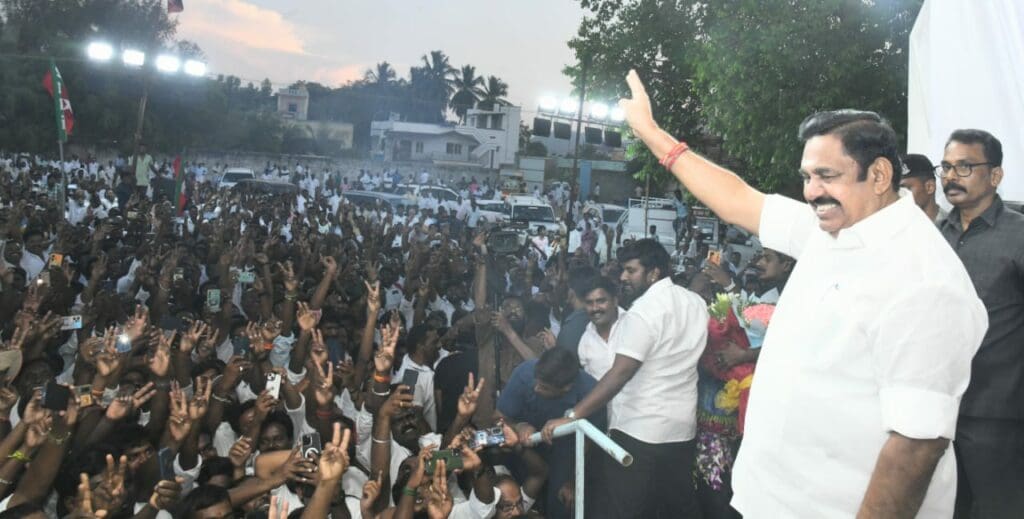
The All India Anna Dravida Munnetra Kazhagam (AIADMK), Tamil Nadu’s principal opposition party, has had a challenging couple of years. Since the passing of party stalwart Jayalalitha in 2016, the party has struggled to find its footing. In the 2019 Lok Sabha Polls, the AIADMK-led NDA bloc secured only one seat, with its combined vote share standing at 33%, the party’s lowest since 1998. Many political commentators had then attributed the party’s rout in the polls to its decision to align with the BJP in 2019.
In September 2023, however, AIADMK snapped ties with the BJP, citing differences with the BJP state leadership. With the Lok Sabha polls just around the corner, let’s assess where the AIADMK stands and whether it can regain its lost glory.
Inability to forge a strong alliance
The DMK under the INDIA bloc has forged a formidable alliance with key players in the state, including Congress, Viduthalai Chiruthaigal Katchi (VCK), CPI, CPI(M), IUML, among others. Meanwhile, the BJP has roped in Pattali Makkal Katchi (PMK), Amma Makkal Munnetra Kazhagam (AMMK), and Tamil Manila Congress (TMC) to contest under the NDA bloc. BJP’s alliance with PMK, however, has come at the cost of AIADMK, as the Dravidian party was also engaged in talks to bring PMK into its fold.
Representing the Vanniyar community, PMK holds considerable sway in several northern parts of Tamil Nadu. AIADMK was hoping to capitalize on PMK’s popularity to gain electoral dividends. A PMK-AIADMK alliance would have allowed the party to put up a strong fight against the formidable DMK in places, including Salem and Dharmapuri. PMK choosing to go with BJP instead of AIADMK also doesn’t bode well in terms of perception for the AIADMK.
The lack of strong parties under its fold has forced AIADMK to grant 5 seats to DMDK, a number that is very disproportionate considering the very minimal vote share that DMDK possesses. This would mean that AIADMK will have to carry the DMDK on its own and cannot expect significant electoral dividends from DMDK. AIADMK is contesting 33 seats on its own. Apart from DMDK, the party has clinched alliances with Puthiya Tamilagam and SDPI, allocating one seat to each of these parties.
Ambiguous minority outreach
When the BJP and AIADMK were alliance partners, many accused the Dravidian party of adopting an anti-minority stance. Following the split, to reclaim its secular credentials back, AIADMK has made persistent efforts to reach out to minorities, particularly Muslims. Party general secretary, Edappadi K Palaniswami, has repeatedly labelled the ruling Stalin-led DMK government as anti-Muslim. Seeking to garner support from the Muslim vote bank, Palaniswami has advocated for the release of Muslim prisoners in the Assembly. However, the minority outreach rhetoric likely won’t cut ice with the Muslims in the state.
This is because the party has failed to infuse confidence among the minorities that it won’t ally with the BJP again in a post-poll scenario. The fear among minorities is validated by the AIADMK tepid criticism of the Modi-led BJP government.
Even in the official announcement detailing the AIADMK-BJP split, the Dravidian party has taken a cautious decision to not tear into the BJP or Modi leadership. This was despite the fact that AIADMK was increasingly frustrated with the BJP state President Annamalai’s scathing attack on party stalwarts including the much revered Jayalalitha.
Since the split, AIADMK has refrained from launching any direct attack on Modi. This comes at a time when Prime Minister Narendra Modi has grown synonymous with the BJP.
The disillusionment among Muslims is further exacerbated by AIADMK’s failure to field a single Muslim candidate in the upcoming 2024 polls. With Muslims constituting the third-largest religious group in Tamil Nadu, accounting for 5.8% of the population, this decision could significantly impact the party’s electoral prospects in constituencies such as Vellore, Ramanathapuram, Nagapattinam, and Coimbatore, where Muslims are numerically significant. Adding to all of this, minority concerns also don’t figure in AIADMK’s poll manifesto.
BJP’s rainbow coalition may undermine AIADMK’s prospects
BJP and its allies are expected to play spoilsport for the AIADMK in a handful of constituents. Take Ramanthapuram, for instance, where Muslims makes up 10% of the population. In Ramanathapuram, the BJP has persuaded former AIADMK leader and Ex-Tamil Nadu CM O Paneerselvam to contest as an independent candidate. OPS hails from the Mukkulathor community, which enjoys decisive electoral clout in Ramanathapuram. Many Hindus who perceive OPS as having been mistreated by the AIADMK leadership are likely to rally behind him. Since IUML, under the DMK-led front, has fielded sitting MP Navas Kani, Muslim votes are expected to gravitate towards IUML.
Meanwhile, Hindu votes may split between BJP and AIADMK, with the BJP-led bloc potentially holding a slight advantage due to its ally AMMK’s sway in the constituency. In 2019, AMMK bagged over 1 lakh votes in four parliamentary constituents Theni, Sivaganga, Ramanathapuram, and Virudhunagar, no small feat for a party that was launched only in 2018. Interestingly, the party founder T.T.V Dhinakaran formed AMMK as the breakaway faction from AIADMK after his expulsion from the party.
Apart from a weak alliance, and disenchantment among minorities AIADMK’s woes are also compounded by its lack of a Prime Ministerial candidate and inability to produce charismatic leaders who can attract crowds. Despite these challenges, AIADMK remains miles ahead of other opposition parties in the state in terms of vote percentage.
Tamil Nadu is gearing up for a multi-cornered fight between the three alliances in a heated electoral battle. The state along with Puducherry goes to polls on April 19 to elect 40 members for the 18th Lok Sabha.



